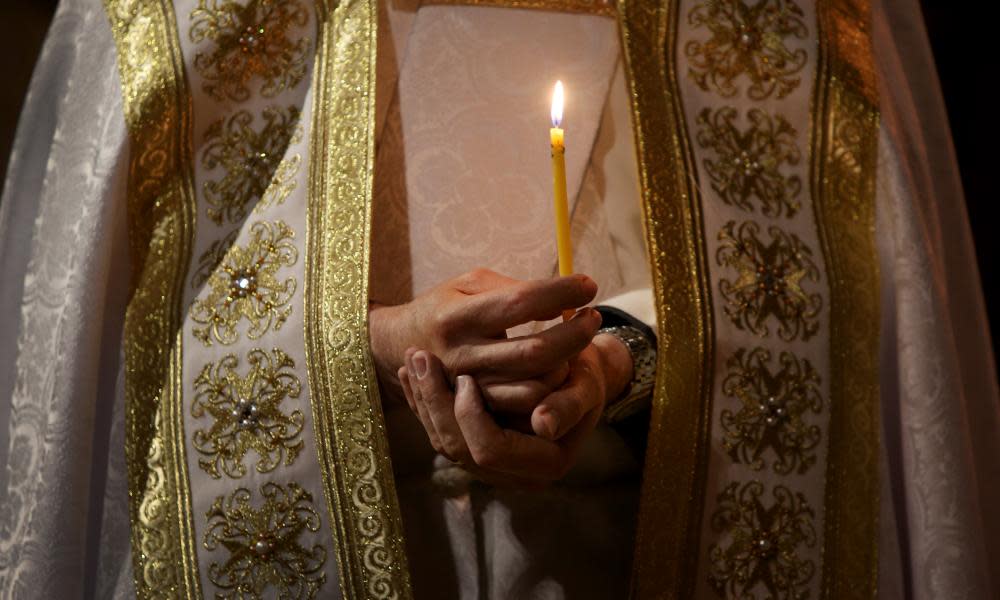Australian Anglican church states it ‘declined to affirm same-sex marriage’ as conservatives break away

The senior bishop of the Anglican church in Australia says a breakaway diocese has been founded on “perplexing” beliefs and could confuse congregations in a “tragically divided world”.
The Diocese of the Southern Cross was launched this week with the former Anglican archbishop of Sydney Glenn Davies appointed its bishop. It is part of the global Gafcon movement which has divided the church.
Gafcon says it is fighting a “revisionist” interpretation of the Bible by the leadership of the Anglican church, which has allowed the ordination of women, the blessing of same-sex marriages and more relaxed views regarding divorce.
Related: First diocese of Australia’s breakaway Anglican church officially launched
But the Most Rev Geoffrey Smith, the archbishop of Adelaide and primate of the Anglican Church of Australia, said in a statement on Thursday that while the newly launched diocese may “mirror” the characteristics of an Anglican diocese, it should be considered a new denomination.
“It is unfortunate that confusion may well result from the establishment of this organisation among existing members of the Anglican Church of Australia and among people wishing to connect with the Anglican Church of Australia,” Smith said.
“The meeting of the General Synod held in May this year clearly affirmed the view that marriage is between a man and a woman, and declined to affirm same-sex marriage. It is perplexing therefore that the leaders of this breakaway movement cite the reason for this new denomination as the failure of General Synod to explicitly express an opinion against the blessing of same-sex marriages.”
Individual dioceses are free to bless same-sex unions in Anglican churches.
As primate, Smith chairs the meeting of the General Synod but has no power over other Anglican dioceses.
“It is always easier to gather with those we agree with. But in a tragically divided world, God’s call and therefore the church’s role includes showing how to live together with difference,” he said.
“My conviction is that the Anglican Church of Australia can find a way to stay together, graciously reflecting God’s great love, with our differences held sincerely. This week’s announcement makes achieving that end more difficult but not impossible.”
In a letter to his parishioners, the Right Rev Mark Short, the bishop of the diocese of Canberra and Goulburn, urged them to share their views towards the new diocese respectfully and kindly.
But he also said he had asked Gafcon, which is holding a conference in Canberra this week, to make clear in any media releases that they were not associated with his diocese.
“I recognise that across our diocese there will be different views about the merits or otherwise of these developments,” Short wrote about the new diocese.
“Such differences are a normal part of being a Christian family. If you decide to share your views, I please ask that you do so in an attitude of respect, kindness and openness towards each other.”
The launch of the Southern Cross diocese is expected to accelerate the schism between the conservative and progressive sides of the church – a dynamic that has played out across the world.
Directors of Gafcon Australia who remain within the Anglican church include the Archbishop of Sydney, Kanishka Raffel, the bishop of Tasmania, Richard Condie, and people in leadership positions within churches in Darwin, Cairns, Rockhampton, Perth and Melbourne.
Many of these individuals and churches were already in open conflict with more progressive dioceses – including Melbourne, Adelaide, Newcastle, Wangaratta and Gippsland – before the Diocese of Southern Cross was founded.
Gafcon Australia has delivered multiple media statements criticising the approach of these dioceses, including when two men in a civil marriage were blessed in Wangaratta.
One person familiar with the conflict, who did not wish to speak publicly, said he expected progressive churches would bless even more same-sex marriages in a bid to further differentiate themselves from the conservatives.

 Yahoo Movies
Yahoo Movies 
